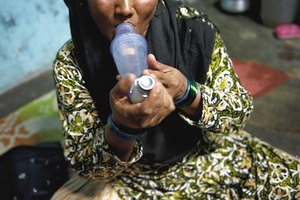Indian bureaucracy slows treatment of tuberculosis
Rahima Sheikh, an Indian tuberculosis patient carrying a nearly untreatable strain of the disease, is perilously close to running out of the medicines that appear to be saving her life.
Mrs. Sheikh, whose six-year descent to ever-more-resistant TB was reported last month in a front-page article in The Wall Street Journal, is one of 16 patients identified by Mumbai doctors to be resistant to virtually all traditional TB treatments.
This year Mrs. Sheikh returned to her home village, about 1,000 miles from Mumbai, expecting to die, only to find that her unorthodox drug regimen was finally able to keep her disease at bay.
Mrs. Sheikh's latest predicament exposes the bureaucratic tangle that can hinder treatment even for the most high-profile of India's TB patients, like Mrs. Sheikh, whom Mumbai's top TB official termed a "VVIP"—a very, very important person—because of the attention brought by the Journal article.
Mumbai officials have publicly pledged free treatment for Mrs. Sheikh and other, similar patients with extreme forms of drug resistance within the city's jurisdiction. But Mrs. Sheikh has now become caught in the bureaucracy of India's incomplete national network for treating the most virulent TB.
Brief lapses in treatment can allow TB to mutate in a patient and become more resistant to drugs. That even a prominent patient could potentially run out of drugs shows the depth of the problem India is now scrambling to fix.
Two weeks ago, Ashok Kumar, head of India's national TB-control program in New Delhi, said in an interview that he would make sure Mrs. Sheikh continued to be treated. On Monday, however, Mumbai's top TB official, Mini Khetrapal, said the city would stop providing her medicines because Mrs. Sheikh no longer lives within the city.
"We are asking her to come back to Mumbai if she wants more medicines because we have to monitor her side effects," Dr. Khetrapal said Monday.
Mrs. Sheikh says she is too poor to return to the city. "We can go to Mumbai and get the medicines, but we'd have to live homeless in the street. I'm too sick to live on the street," she said. In pursuit of treatment the past six years, her family sold their land and spent their life savings.
On Wednesday, Dr. Kumar, the national official, reiterated that the government would keep providing her medication. He said he now has instructed his staff to tell Mumbai officials to continue to courier Mrs. Sheikh's medicines to her in Uttar Pradesh, the state where she now lives, until that state is able to take over her treatment.
Dr. Kumar said he is rapidly expanding India's capacity to diagnose and treat multidrug resistance. India now has 42 labs that can make the diagnosis, he said. However, Mrs. Sheikh's area of Uttar Pradesh—India's most populous state—isn't yet served. By March, Dr. Kumar said, he plans to have the country covered.
It was unclear Wednesday night when more medicines might reach Mrs. Sheikh. She has 10 days' supply left.
In the past, medicines from Mumbai have arrived several weeks late. A recent donation to Mrs. Sheikh of 20,000 rupees, about $400, allowed her to purchase medicines and tide herself over. That money is now depleted.
TB, a contagious disease that mostly affects the lungs, afflicts about 2.3 million Indians a year, according to the World Health Organization. India began in 1997 to build a nationwide program to diagnose and treat the disease. But India was slow to diagnose and treat patients with multidrug resistant TB. There are now signs of an epidemic in some parts of the country, particularly Mumbai.
In Mrs. Sheikh's case, Mumbai TB expert Zarir Udwadia prescribed an experimental treatment, including drugs for leprosy and psychosis. It has held her disease in check for the past six months. Mrs. Sheikh needs to continue treatment at least an additional 18 months for a chance of being cured.
The Wall Street Journal
http://online.wsj.com/article/SB10000872396390444799904578048560180386162.html


